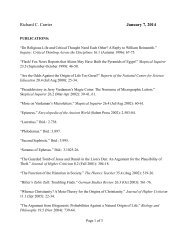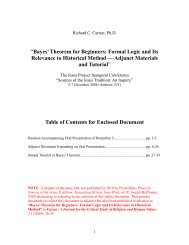Cultural History of the Lunar and Solar Eclipse in ... - Richard Carrier
Cultural History of the Lunar and Solar Eclipse in ... - Richard Carrier
Cultural History of the Lunar and Solar Eclipse in ... - Richard Carrier
You also want an ePaper? Increase the reach of your titles
YUMPU automatically turns print PDFs into web optimized ePapers that Google loves.
<strong>the</strong>reafter by publish<strong>in</strong>g a treatise.” 27 This suggests that <strong>the</strong> Pydna story could have<br />
been colored by what Gallus wrote, or his fame for <strong>the</strong> latter may have <strong>in</strong>spired a legend<br />
surround<strong>in</strong>g <strong>the</strong> earlier event. But whe<strong>the</strong>r truth or <strong>in</strong>vention, <strong>the</strong> story is important, for it<br />
represents an example <strong>of</strong> <strong>the</strong> legend <strong>of</strong> <strong>the</strong> ‘science lesson’ among <strong>the</strong> lore <strong>of</strong> elites,<br />
someth<strong>in</strong>g which replaces for <strong>the</strong>m <strong>the</strong> mythology <strong>of</strong> <strong>the</strong> masses, <strong>and</strong> becomes a<br />
paradigm example <strong>of</strong> <strong>the</strong> difference between <strong>the</strong> educated <strong>and</strong> <strong>the</strong> uneducated, <strong>and</strong><br />
between <strong>the</strong> enlightened <strong>and</strong> <strong>the</strong> superstitious. We hear <strong>of</strong> an explicit attempt to make<br />
this dist<strong>in</strong>ction <strong>in</strong> Plutarch, who writes that women should be educated <strong>in</strong> astronomy so<br />
that <strong>the</strong>y will not be superstitious, <strong>and</strong> he notes that <strong>the</strong>y should learn <strong>the</strong> story <strong>of</strong><br />
Algaonike, a witch who used scientific eclipse predictions to dupe <strong>the</strong> masses. 28<br />
Stories such as <strong>the</strong>se formed an excellent framework for transmitt<strong>in</strong>g <strong>the</strong> scientific lore<br />
<strong>of</strong> eclipses <strong>in</strong> <strong>the</strong> context <strong>of</strong> relat<strong>in</strong>g an act <strong>of</strong> heroism, though this lore was only<br />
transmitted among <strong>the</strong> literate.<br />
As one might expect, we soon f<strong>in</strong>d this heroic tale overtly fictionalized. In his<br />
essay On Benefits, while conclud<strong>in</strong>g his answer to <strong>the</strong> question <strong>of</strong> “whe<strong>the</strong>r it is<br />
shameful to be outdone <strong>in</strong> acts <strong>of</strong> k<strong>in</strong>dness,” 29 Seneca has occasion to address <strong>the</strong><br />
k<strong>in</strong>ds <strong>of</strong> benefits wise men have to <strong>of</strong>fer k<strong>in</strong>gs, which outdo any gift a k<strong>in</strong>g can bestow.<br />
The last example he uses is <strong>the</strong> truth about eclipses, which <strong>in</strong>volves him <strong>in</strong> a marvelous<br />
contrafactual, propos<strong>in</strong>g <strong>the</strong> hypo<strong>the</strong>tical case <strong>of</strong> Socrates teach<strong>in</strong>g this to k<strong>in</strong>g<br />
Archelaus, conclud<strong>in</strong>g, “How great would <strong>the</strong> benefit have been, if he had dragged <strong>the</strong><br />
frightened k<strong>in</strong>g from his hid<strong>in</strong>g place <strong>and</strong> told him to be <strong>of</strong> good cheer,” 30 <strong>and</strong> <strong>the</strong>n<br />
expla<strong>in</strong>ed how eclipses really worked. It is noteworthy that Seneca exhausts a good<br />
deal <strong>of</strong> <strong>in</strong>k spell<strong>in</strong>g out this explanation, show<strong>in</strong>g <strong>of</strong>f his knowledge, <strong>and</strong> <strong>in</strong>struct<strong>in</strong>g his<br />
readers. This penchant for giv<strong>in</strong>g lengthy footnotes on <strong>the</strong> causes <strong>of</strong> eclipses appears<br />
<strong>in</strong> numerous writers <strong>of</strong> <strong>the</strong> period. This may be just ano<strong>the</strong>r reflection <strong>of</strong> <strong>the</strong> Roman<br />
fasc<strong>in</strong>ation with rhetorical topoi, or it could suggest that this was not common<br />
knowledge among <strong>the</strong> literate -- or that many authors thought it was not. 31 Pl<strong>in</strong>y, for<br />
<strong>in</strong>stance, laments that “we” do not give any thanks to astronomers, but prefer to<br />
compose annals <strong>of</strong> blood <strong>and</strong> slaughter, “so that <strong>the</strong> crimes <strong>of</strong> men may be well known<br />
to those who are ignorant <strong>of</strong> <strong>the</strong> very universe.” 32 Never<strong>the</strong>less, both Pl<strong>in</strong>y <strong>and</strong> Seneca<br />
27 Natural <strong>History</strong>, 2.9 (53): et rationem quidem defectus utriusque primus Romani generis <strong>in</strong> vulgum<br />
extulit...sollicitud<strong>in</strong>e exercitus liberato...mox et conposito volum<strong>in</strong>e.<br />
28 Advice to Bride <strong>and</strong> Groom, 145C-D.<br />
29 On Benefits, 5.7.1: an turpe esset beneficiis v<strong>in</strong>ci.<br />
30 Ibid., 5.6.4: quantum fuisset beneficium, si timentem e latebris suis extraxisset et bonum animum habere iussisset.<br />
31 e.g. Dio Cassius, 60.26; Valerius Maximus, 9.1; Plutarch, Aemilius Paulus, 27.7-10, Nicias, 23; <strong>in</strong> a much later<br />
period, Ammianus Marcell<strong>in</strong>us practically <strong>in</strong>serts an essay on <strong>the</strong> subject <strong>in</strong>to his history at 20.3. I cannot imag<strong>in</strong>e<br />
any o<strong>the</strong>r reason for this, s<strong>in</strong>ce <strong>the</strong> po<strong>in</strong>t could be made with a casual remark, as it is with most o<strong>the</strong>r natural<br />
phenomena, trust<strong>in</strong>g <strong>in</strong> <strong>the</strong> common knowledge <strong>of</strong> <strong>the</strong> reader (as does Front<strong>in</strong>us, Stratagems, 12.8-9, although he is<br />
aim<strong>in</strong>g at brevity; but Plutarch also assumes this knowledge is already possessed by <strong>the</strong> reader <strong>of</strong> Advice to Bride<br />
<strong>and</strong> Groom, 145C-D). Seneca’s ‘dissertation’ is <strong>in</strong> fact <strong>the</strong> longest to be found <strong>in</strong> a work not devoted to natural<br />
phenomena, apart from Marcell<strong>in</strong>us, <strong>and</strong> it goes way beyond <strong>the</strong> bounds <strong>of</strong> necessity <strong>in</strong> <strong>the</strong> given context. One<br />
would never see such digressions <strong>in</strong> modern works. The edict <strong>of</strong> Claudius (below) also suggests a belief that <strong>the</strong>re<br />
were literates lack<strong>in</strong>g this knowledge.<br />
32 Natural <strong>History</strong>, 2.6 (43): ut scelera hom<strong>in</strong>um noscantur mundi ipsius ignaris.








